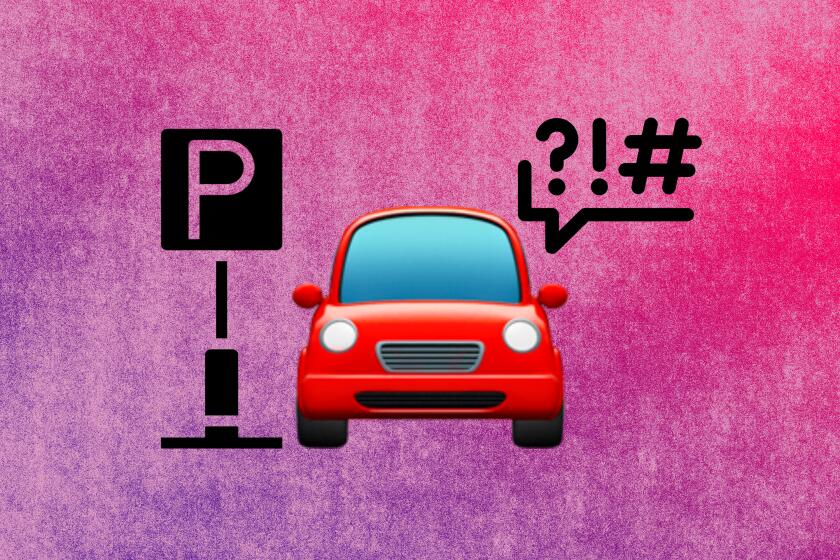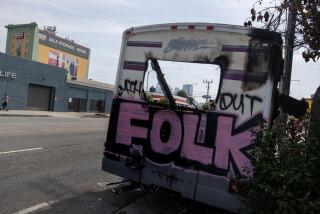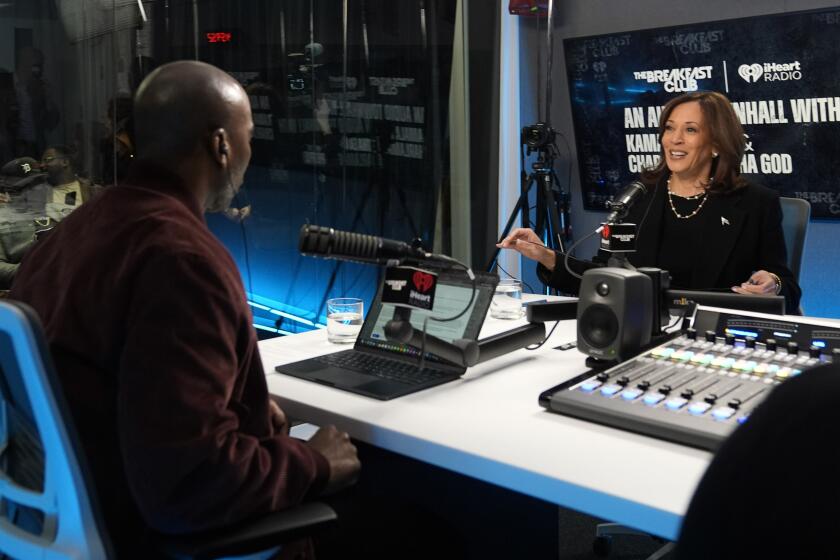
It’s bad enough to have your car towed. You shouldn’t have to solve the Da Vinci Code to get it back.
Ticketed, booted, towed — there are a million hard-luck parking enforcement stories in the naked city. This is one of them.
Recently, my adult daughter agreed to house-sit for friends in Culver City. Her duties included walking the dog and moving the car to avoid street-sweeping restrictions. These she did — until tragedy struck.
The dog is fine, but the car got towed.
Because she was not using her friend’s car, once she moved it — noting the day when she would have to move it from where she had parked — she did not check it again until she went to move it once more. Only to find it gone.
Apparently, in the subsequent three days, a temporary “No Parking” sign had been taped to the tree in front of the car. There was no cone. From the sidewalk it looked like any garage sale notice.
Though it happens to the best of us, discovering that your car has been towed is always a shock. Particularly if you are, like my daughter (and me), someone who scrupulously reads L.A.’s often cacophonous and conflicting parking signs while checking to ensure your bumper is not hanging over into the red zone or too close to a driveway.
Denial, anger, bargaining, depression, acceptance: You experience all of them as you stand staring at the empty spot where your car should be.
This being her first experience with parking violation hell, my daughter called me. I told her to call the number listed on the sign to find out which lot the car had been towed to, then take an Uber to the lot, pay a bunch of money in fines and fees and retrieve it. Also that she should do it right away, as the overall fee will increase with the time the car is left unclaimed.
Parking in Los Angeles is about luck and skill. So save time and money by learning these hacks with yellow curbs, green curbs, holiday rules, valet and more.
But she shouldn’t be too upset, I reassured her. Retrieving a towed car is a pain, and expensive, but it was something of a milestone in Los Angeles life. It would be sorted soon enough.
Which just goes to show you how much I know.
She called the number on the sign (311), which transferred her to the Department of Transportation. She was told she was 42nd in the queue and, two hours later, was referred to a local tow yard. She called the tow yard and was told that not only did they not have the car, they didn’t even tow in her area; from there she was referred to the Culver City Police Department’s nonemergency line.
They in turn told her the car had been towed by the Los Angeles Police Department, so she in turn called the LAPD and was directed to two LAPD websites. The first offered no help; the second, Official Police Garages (subtitle “We keep L.A. moving”), had a search function that, after my daughter put in the pertinent information, revealed no information. Thinking she must have typed the license plate number or the address wrong, she tried two more times — to no avail.
So she called the Culver City police again. This time, she was told there was a case number and to check back with Official Police Garages.
By now four or five hours had passed. Like most people, she has a job that does not allow for spending endless hours trying to track down a towed car. But six hours after she discovered the car was gone, she tried the website again. And was informed that, because she had used up her three allotted chances to locate a vehicle in a 24-hour period, she would not be able to check again until the next day.
This ensured that she would be paying additional fees for time spent in whatever garage had received the car — and also that she would have to make it through an entire night wishing she had never been born.
Knowing a mental breakdown when I hear it over the phone, I searched the garage website twice over the next couple of hours myself — no dice — then reached out to someone who knows much more about these matters than I do. He sent a link to the site’s map, which shows all the official garages. I suggested to my daughter that she start calling those closest to the spot from which the car had been towed.
By then it was midnight and, because she was not prepared to Uber to a police garage in the wee hours, she began afresh the next day. After four calls, she located the car — hurrah — and was told to get to the address, near Los Angeles International Airport, before 10 a.m. or she would be charged for another day. She left immediately, telling her employer she would be an hour late for work. When she arrived at the lot, she paid $365, only to be told that the car wasn’t actually there. She was at the main payment office. The car itself was at another lot 30 minutes away.
For years, anecdotal evidence and scholarly research have shown the dangers social media can hold for kids and teens. The groundbreaking ‘Social Studies’ shows us what that looks like in real time.
The worst thing, she said, was not having to call her boss again. Or the second Uber ride of the day.
It was how the guys at the first address had stared when she burst into tears.
Which is, frankly, outrageous. If people are regularly being sent to one place to pay only to find that they must go to another to collect their actual car, especially after such a phone-tag odyssey, tears must be an everyday occurrence.
When she got to the correct lot, there was no system to locate the car so she and an attendant had to walk around the lot for 15 minutes to find it. By the time she finally retrieved her friend’s vehicle, I felt like I needed five days bed rest; my daughter was trying to think of ways she could park the car inside her friend’s apartment.
None of which is to suggest that the LAPD should not tow cars that are parked in No Parking zones, temporary or permanent. Curb space must be cleared, or kept clear, for all manner of good reasons, including emergency vehicle access and film shoots. A more experienced city dweller might have made it a point to check the parking status on a daily basis, but having been raised in the wilds of La Crescenta, where we have street parking for miles and get notices of temporary restrictions a week in advance, my daughter was not accustomed to the meaner streets of Culver City. It was her mistake.
At least it was until she had to spend more than 24 hours, multiple phone calls to an assortment of agencies, and various searches of the internet trying to locate the towed car. (And allowing only three searches per day, LAPD? It’s almost as if you want the car to sit in your garage longer than necessary.)
My daughter was fortunate in that she had a smartphone, an understanding employer, no dependents, enough money to afford not only the fees and fines but the two Uber rides and no immediate pressing need for the car.
Imagine if she had been a single mother who could not take time away from work to call and search, who needed the car that was towed in the morning to do her job or pick up her kids in the late afternoon. Or someone without constant access to a phone, the internet and a person who knew there was a map of all the LAPD garages. (Never mind what the final bill would have looked like if my daughter had not been able to get in touch with her friend, who was able to send her a copy of his ID and a letter saying she could pick up the car.) It’s a Kafkaesque experience that only worsens the consequences for those who can already ill afford a violation, and to little evident purpose.
Sure, there should be a price for parking in a no-parking zone. But asking law enforcement, “Dude, where’s my car?” and not getting an answer shouldn’t be one of them.
More to Read
The biggest entertainment stories
Get our big stories about Hollywood, film, television, music, arts, culture and more right in your inbox as soon as they publish.
You may occasionally receive promotional content from the Los Angeles Times.













